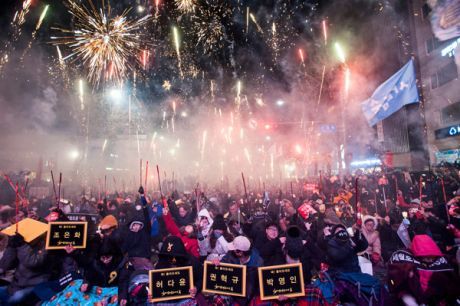Shared
You are here
Protests get rid of corrupt president in South Korea

December 14, 2016
Around one million people took to the streets of South Korea last Saturday to demand president Park Geun-hye resign immediately. They defied calls from mainstream newspapers and MPs to stop protesting after the parliament voted for her impeachment on Friday.
One university student said, “Do not trust them saying that we should now stay home. We need to keep up the protests until Park admits her defeat and steps down.” Many also demanded that the prime minister, who automatically became acting president, should also resign. They have raised doubts about whether the constitutional court, which has to ratify the impeachment, can be trusted.
Impeachment
A lot of people now feel that they have the power to change society after the impeachment motion passed in parliament with an overwhelming majority. But there are also obvious reasons why they believe the fight isn’t over yet.
Ministers appointed by Park are still in power and the prime minister is a notorious right wing figure. The constitutional court is also a very conservative force. They supported Park when she denied legal trade union status for the teachers’ union and when she forced the Unified Progressive Party—which had five MPs—to disband. Park has also said she will find “every means possible” to overturn the impeachment.
In response the umbrella organisation leading the movement, Popular Action (PA), reaffirmed its demand for Park’s “immediate resignation”. It also demanded that all the ministers should resign.
But the opposition parties do not support the movement’s demand to oust the ministers and are instead devoting their efforts to beginning negotiations with the ruling party. They now say protesters should leave the situation in the hands of politicians and the constitutional court. But these parties are preoccupied with winning the high ground for the upcoming presidential election next year.
NGOs are the most moderate forces within PA and have a long tradition of supporting the main capitalist party, the Democratic Party. They argue that the movement needs to take a “strategic step” towards supporting bourgeois opposition parties.
The Stalinists also want to limit the movement to supporting the Democratic Party so that they might stand a chance of participating in a future government. As a result, Stalinists and NGOs constitute conservative forces within PA.
But their views don’t represent the true feelings of protesters. Many have deep doubts about the opposition parties after experiencing years of political manoeuvres and betrayals.
Moreover, radicalisation is taking place among trade unionists and the youth. One of our PA stewards recently reported, “Every week, hundreds of people apply for a chance to deliver a speech at the protest. What’s interesting is that most of them are trade unionists and youths. Many trade unionists are eager to say that it was them who led the resistance against Park for years. Young people want to express their anger against social inequality and Park’s cover-up of the Sewol ferry disaster when 250 high school students drowned.”
Movement
The trade union movement and the campaign for Sewol Justice are the main forces behind the current mass movement. Many commentators who put infighting among the ruling class and the media’s coverage of the scandal before the resistance movement are missing the social dynamics at work.
Left wing forces within PA—including us—are arguing that the movement should preserve its political independence from opposition parties and promote such radicalisation. PA has decided to continue hosting protests for every Saturday this month, with special emphasis on 31 December.
We are trying to seize opportunities to grow our roots within the working class, especially among youths and trade unionists.
Workers’ Solidarity is Socialist Workers’ sister publication in South Korea. This is shared from Socialist Worker (UK)
Section:









